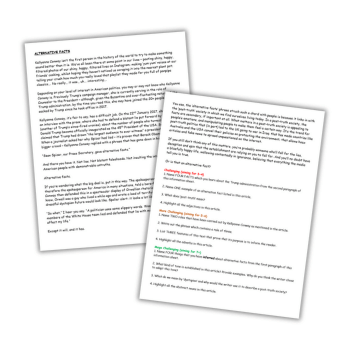Word docs with differentiated questions
KS3, KS4
Years 7-11
These easy-to-use KS3 reading comprehension packs feature three sections of differentiated questions.
What are the articles about?
Alternative facts
The first article discusses the concept of “alternative facts”. This phrase was famously introduced by Kellyanne Conway, a former senior member of the first Trump administration, during a press interview in 2017.
It highlights how this phrase epitomises a trend towards post-truth politics, where emotions and manipulation often supersede factual accuracy.
The author suggests that this phenomenon has significant societal implications. It influences decisions on issues like environmental protection and even leads to military conflicts.
Ultimately, the article challenges readers to consider the ramifications of living in a post-truth society. This is one where facts are often secondary to narratives and emotions.
Sugar tax
The second article explores the debate around the sugar tax on fizzy drinks, focusing on its impact and implications. While acknowledging the health risks of excessive sugar consumption, the author questions whether taxation is an appropriate solution, especially as it disproportionately affects poorer people.
They argue that education, not government interference, is a more effective way to encourage healthier choices and highlight the limits of the “Nanny State” in protecting individuals from all harm.
How to use these KS3 reading comprehension resources
Read the articles in form time as part of a literacy focus, or in an English lesson for KS3/KS4 GCSE comprehension training.
Pupils can then answer one of three question sets (challenging, more challenging and mega challenging) to demonstrate their understanding of the text.
Example comprehension questions
- List three features of this text that prove that its purpose is to inform the reader.
- Name four things that you have inferred about alternative facts from the first paragraph.
- Find two examples of imperative verbs in the text.
- How has the writer used tone in order to manipulate the reader?
Find more English resources at englishgcse.co.uk. Download more Year 7 English worksheets and another reading comprehension PDF.














